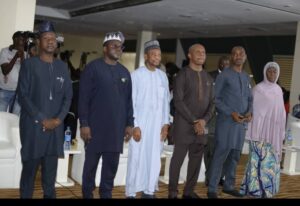

By Oluwabunmi Stephen.

The United Nations Industrial Developmental Organisation (UNIDO) and the European Union (EU) have expressed their commitment to support Nigeria’s efforts in decarbonizing its economy.
It is also aimed at achieving a transition to net zero by 2060 through increased use of renewable energy sources in the final energy mix, adoption of energy efficiency measures and reduction of Green House Gas emissions.
The United Nations Assistant Secretary – General, who also serves as the Resident/Humanitarian Coordinator and Designated Official for Nigeria, Mr. Mohammed Malick Fall, reaffirmed the commitment in a welcome remarks during the launch of the €9 million energy project and a workshop.
The workshop has as theme, “Promoting Small Hydropower Development and Circular Economy approaches in Nigeria” held in Abuja, Nigeria’s Capital.
The projects – Small Hydro Power Development for Agro-industry Use in Nigeria (SHP-DAIN) and Advancing Nigeria’s Green and Just Transition to Net Zero through Circular Economy Practices are in continuation of commitments to supporting Nigeria in providing clean, affordable and sustainable energy for all, enhance energy accessibility and promote circular economy practices to address pollution and climate change.
While the SHP-DAIN is a three-year project with a budget of €5 million, Advancing Nigeria’s Green Transition to Net Zero through Circular Economy Practices is also a three-year project with a budget of €4 million.
Both projects are part of the EU Global Gateway Strategy, a transformative initiative with the goal of enhancing connectivity, fostering economic growth and promoting sustainability through collaboration.
Speaking during the official launch of the projects in Abuja, the EU Ambassador to Nigeria and ECOWAS, Ms. Samuela Isopi, explained that the SHP-DAIN project would increase the capacity of small hydropower in Nigeria’s total energy mix to promote productivity along the agricultural value chains and other businesses, enhance livelihoods, and promote food security and decent work.
“The SHP-DAIN will support capacity strengthening of major actors from private, government, finance and target Micro, Small and Medium Enterprises (MSME) sectors in the specifics of Small Hydropower (SHP) through tailored training(s) and knowledge management.
“It will support the establishment of SHP of 2MW cumulative capacity for agri-industrial use across the six geo-political zones of Nigeria.
“It will support the development of policy and institutional framework on Renewable Energy (RE) for productive uses to streamline policies/incentive schemes towards a greater use of SHP, with cross-cutting activities for ensuring sustainability, which includes awareness development, visibility promotion, implementation of gender strategies, project management and monitoring”, She noted.
According to her, “Advancing Nigeria’s Green and Just Transition to Net Zero through Circular Economy Practices project is aimed at improving the management of used off-grid energy equipment and plastics through circular economy practices for mitigation of pollution and greenhouse gas emissions.
In his goodwill message, the Deputy Governor of Gombe State, Dr. Manasseh Daniel Jatau, stated that his state has three functional dams which can be harnessed to commence the project.
He therefore appealed for his state to be considered for the project.
“I am happy that the European Union and other countries are enriching us. We are happy that we are here and I want to assure you that Gombe State in particular and I’m sure other states are ready to begin this programme”.
The Minister of Power, Adelabu Adebayo, while officially launching the projects, expressed confidence that the projects would not only enhance the management of used off-grid energy equipment and plastics but also increase agricultural productivity and improve livelihoods. He further inaugurated Project Steering Committees (PSCs) to ensure the success of the projects.
The Project launch and workshop had participants drawn from Federal Ministries of Environment, Budget and Economic Planning, Power, Water Resources, Agriculture and Rural Development, Commissioners from various states, Special Advisers, UNIDO, EU, Civil Society groups, and other relevant Stakeholders.


